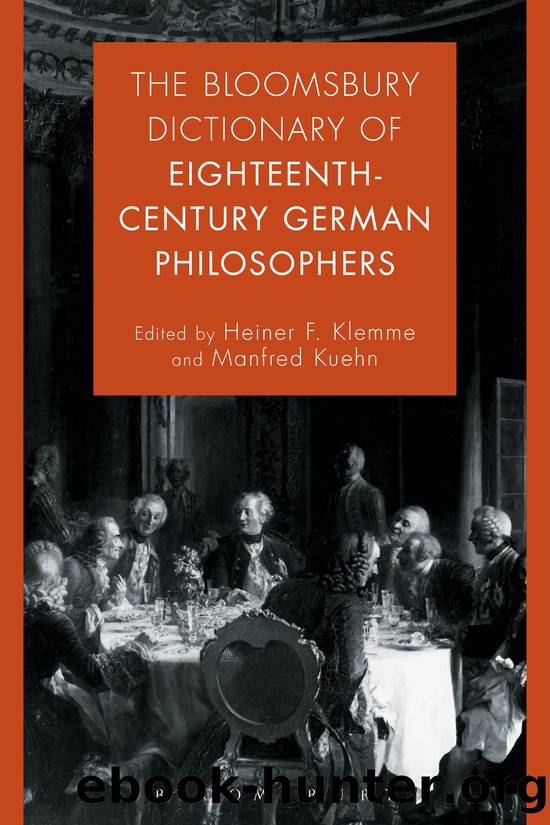The Bloomsbury Dictionary of Eighteenth-Century German Philosophers by Klemme Heiner Kuehn Manfred

Author:Klemme, Heiner,Kuehn, Manfred
Language: eng
Format: epub
ISBN: 9781474256001
Publisher: Bloomsbury UK
KRUG, Wilhelm Traugott (1770–1842)
Wilhelm Traugott Krug was born near Wittenberg on 22 June 1770 and died in Leipzig on 12 January 1842. He was the son of a tenant farmer. Having studied at the universities of Wittenberg, Jena and Göttingen and having habilitated with the dissertation De pace inter philosophos utrum speranda et optanda, he taught as an adjunct at the University of Wittenberg. In 1801, he was appointed professor at the University of Frankfurt/Oder, and in 1805, he became Kant’s successor at the University of Königsberg. From 1809 until his death, he served as professor and also as rector at the University of Leipzig. Krug wrote an autobiography, entitled Krug’s Lebensreise in sechs Stazionen von ihm selbst beschrieben.
Philosophically, Krug was primarily a Kantian, yet not an orthodox one. In his polemical writing against Fichte (Briefe über die Wissenschaftslehre), Schelling (Briefe über den neuesten Idealism. Eine Fortsetzung der Briefe über die Wissenschaftslehre) and Hegel (Der Widerstreit der Vernunft mit sich selbst in der Versönungslehre; Schelling und Hegel oder Die neueste Philosophie im Vernichtungskriege mit sich selbst begriffen) he largely defended the Kantian ‘new idealism’, in contrast to the ‘older idealism’ (of Descartes and Berkeley). Still, Krug also modified Kantian philosophy in certain respects by establishing a ‘system of philosophy’ which he understood as a ‘scientific totality’ (Fundamentalphilosophie, p. 32). As philosophy was for him a ‘science of the original regularity of the entire activity of the human mind, or of the archetype of the self’ (Logik oder Denklehre, p. 3), he defined philosophizing as a ‘contemplation of oneself’ (Fundamentalphilosophie, p. 13).
The complete Krugean system is composed of an ontology, as the fundamental doctrine, and theoretical and practical philosophy. His fundamental philosophy could also be named ‘transcendental philosophy, if only the use of this expression were not so vacillating and indefinite’ (Entwurf eines Neuen Organon’s der Philosophie, p. 101). In fundamental philosophy, Krug searched for the ultimate foundation of philosophy in consciousness as a ‘synthesis of being and knowledge in the self’ (Fundamentalphilosophie, p. 68). He distinguished between a principle of reality – ‘the self as object or knowledge’ (p. 60) – and a few ideal principles. He then tried to unite the material principle and the formal principle of the latter in the highest principle of philosophy: ‘I am active, and I am searching for absolute harmony in all of my actions’ (p. 93). Krug dubbed his new system transcendental ‘synthethism’, which is ‘such a kind of philosophy that adopts the real and the ideal (being and knowledge) as something prior (prius), incapable of further comprehension and explanation’ (Logik oder Denklehre, p. ix). Krug interpreted this inexplicable synthesis of the real and the ideal as an original fact of consciousness. Following the explanation of fundamental philosophy, he developed his theoretical philosophy, which included for him logic, metaphysics and aesthetics. Although his metaphysics had traditional chapters such as ontology, psychology, cosmology and rational theology, his view of metaphysics as ‘epistemology’ or ‘gnoseologia’ was quite unusual (Metaphysik oder Erkenntnislehre, p. 3.). Theoretical
Download
This site does not store any files on its server. We only index and link to content provided by other sites. Please contact the content providers to delete copyright contents if any and email us, we'll remove relevant links or contents immediately.
| Africa | Americas |
| Arctic & Antarctica | Asia |
| Australia & Oceania | Europe |
| Middle East | Russia |
| United States | World |
| Ancient Civilizations | Military |
| Historical Study & Educational Resources |
Magic and Divination in Early Islam by Emilie Savage-Smith;(1533)
Papillon by Henry Charrière(1431)
Bohemians, Bootleggers, Flappers, and Swells: The Best of Early Vanity Fair by Bohemians Bootleggers Flappers & Swells- The Best of Early Vanity Fair (epub)(1403)
Ambition and Desire: The Dangerous Life of Josephine Bonaparte by Kate Williams(1389)
Twelve Caesars by Mary Beard(1315)
Operation Vengeance: The Astonishing Aerial Ambush That Changed World War II by Dan Hampton(1162)
What Really Happened: The Death of Hitler by Robert J. Hutchinson(1162)
London in the Twentieth Century by Jerry White(1146)
The Japanese by Christopher Harding(1132)
Time of the Magicians by Wolfram Eilenberger(1126)
Twilight of the Gods by Ian W. Toll(1117)
Lenin: A Biography by Robert Service(1075)
The Devil You Know by Charles M. Blow(1024)
A Social History of the Media by Peter Burke & Peter Burke(976)
Freemasons for Dummies by Hodapp Christopher;(964)
Napolean Hill Collection by Napoleon Hill(942)
Henry III by David Carpenter;(919)
The Rise and Triumph of the Modern Self by Unknown(913)
Richard III (The English Monarchs Series) by Charles Ross(908)
